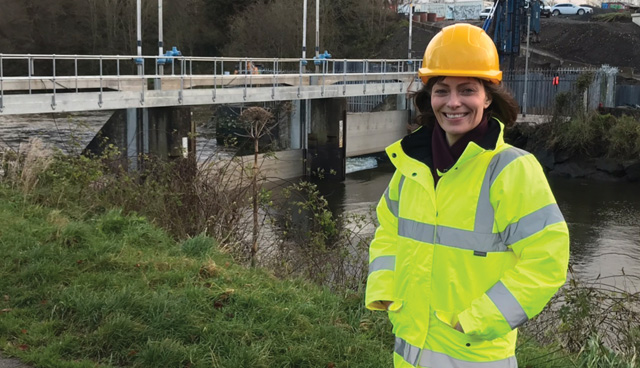Waste and water infrastructure

Infrastructure Minister Nichola Mallon MLA shines a spotlight on why investment in our water and sewerage systems is critical for our future.
Water is an essential part of our daily lives. Turning on the tap is one of the first things we do in the morning and one of the last things at night, with our wastewater continuously being removed in unseen pipes running beneath our feet.
There are 27,000 kilometres of water mains and 16,000 kilometres of sewers in Northern Ireland. On most occasions these underground pipes all work seamlessly beneath the surface but pressure is mounting on our ageing drainage and wastewater infrastructure following years of underinvestment. Combined with the impacts of climate change this is literally creating the perfect storm with potentially devastating consequences. The record high temperatures and prolonged dry spells this summer and the resultant pressure on our water system demonstrate that security of our water cannot be taken for granted.
Already over 100 areas across the North are operating near or above intended design capacity either at the wastewater treatment works or within the sewer network. This means that future connections for developments may not be accepted by NI Water.
This could constrain economic growth and halt building much needed new homes as well as causing likely increased pollution and damage to the environment and greater risk to the population’s health and wellbeing.
No one organisation or government department has the whole answer. In November I published Living with Water in Belfast: An Integrated Plan for Drainage and Wastewater Management in Greater Belfast. Part of my commitment to climate action, this plan is a result of partnership working to deliver a 21st century drainage and wastewater system initially for Belfast and which will hopefully be rolled out to other areas across the North. At £1.4 billion over 12 years it is not a quick or inexpensive fix but this plan sets out how we can achieve a thriving and resilient Belfast which is better protected and prepared for the future.
The right infrastructure will improve people’s lives and I am continuing to fight for long-term investment to secure the future of water and waste water infrastructure. This financial year I allocated a combined capital and resource budget of £344.5 million to NI Water for 2021/22 from my department’s budget. This is the first year in a long time that NI Water has been fully funded.
In May 2021, the Utility Regulator published its Final Determination that NI Water will require investment of around £2 billion in water and wastewater services over the six year price control period. Sustained and secure levels of investment over multiple price controls will be required if we are to recover from the historic underinvestment in our water and sewerage services that has created the current situation of capacity constraint across the North. If NI Water is fully funded for PC21, it plans to remove 49 of the 100 areas from constraint where the wastewater treatment works are operating near or above design capacity. However, NI Water has indicated that a further 30 economically constrained areas may emerge during PC21.
NI Water also has an important role to play in addressing the effects of climate change. Allocation of this funding will enable NI Water to improve the efficiency of its service delivery, reduce its carbon impact and strive for net zero ambitions.
Just ahead of my attendance at COP26, NI Water published its Power of Water report which demonstrated that, whilst the technology is constantly evolving, we already have the elements to help us change the way we use, store and generate energy right across the utilities, whether it is in the water industry, electricity or transport.
My department, alongside other departments, has done much to help NI Water take the first step towards greater sustainability, for example by supporting the installation of solar farms and through the early adoption of hydrogen electrolysis using wastewater.
This is collaborative partnership and proof that we can lead the way in the circular economy and not wait for answers from elsewhere.
Flood risk
In addition to the provision of having clean safe drinking water and having an effective system to deal with wastewater, there is also a need to successfully manage flood risk particularly due to increased risks associated with climate change. This year, I have allocated over £19 million for development of flood alleviation projects and I recognise the need for sustained and increased investment in this area of work for years to come.
I remain committed to the delivery of flood alleviation projects such as the Shimna and Belfast Tidal Flood Alleviation Schemes. The Belfast Tidal Flood Alleviation Scheme involves the detailed design and construction of over five miles (approximately 8.5km) of flood defences along the tidal River Lagan covering the area from Belfast Harbour to Stranmillis Weir. The scheme has not only been designed to integrate with the surrounding landscapes and streetscapes but also takes into account the latest projections on climate change. My department will also soon publish the second cycle of the Flood Risk Management Plans, outlining the objectives and measures to manage flood risk that will benefit citizens across all of Northern Ireland.

Planning also has a key role to play and my department is working closely with key stakeholders to ensure sound, realistic and evidence-based local development plans (LDPs) that take into account the availability of necessary supporting infrastructure, including wastewater treatment and sewerage network capacity. These should focus on growth in sustainable locations where there is existing capacity and maximise the use of existing infrastructure. This involves close liaison with infrastructure providers like NI Water to ensure proposals can be supported by investment and working with councils where capacity constraints are identified to establish if these can be overcome.
In planning policy terms, I also want to ensure my department’s planning policy remains up to date, robust and fit for purpose which is why I have announced reviews of the strategic planning policy for renewable and low carbon energy as well as oil and gas development including development involving fracking. These are all important for working together to help to tackle climate change.
What is important now is that we seek to build on all of this work. We must work together with urgency to meet our climate change ambitions, grow our economy, address regional imbalance, improve wellbeing and support a thriving region where people want to live, work, visit and invest.





